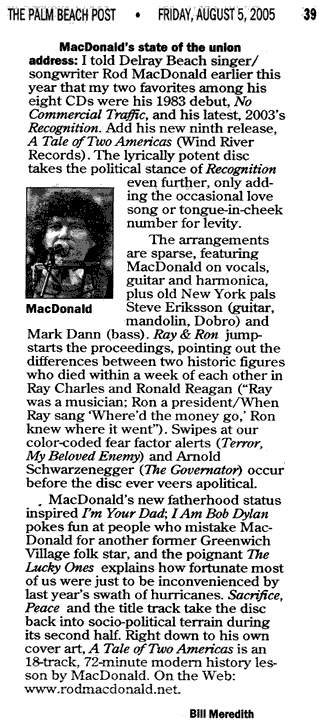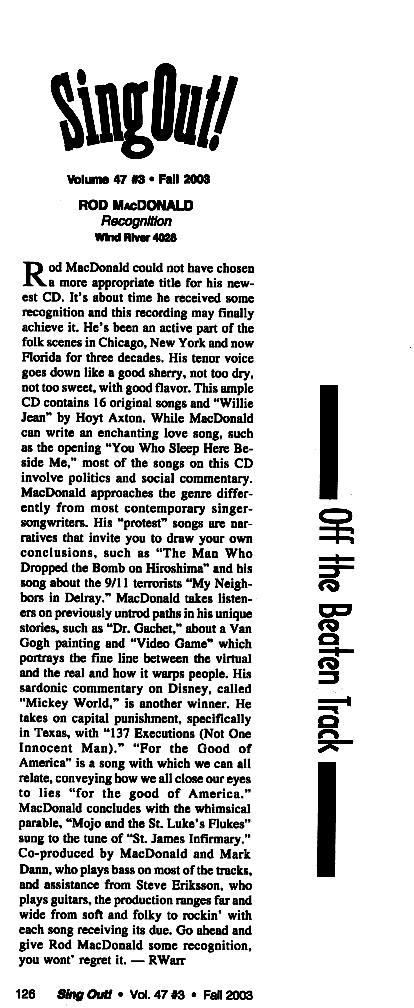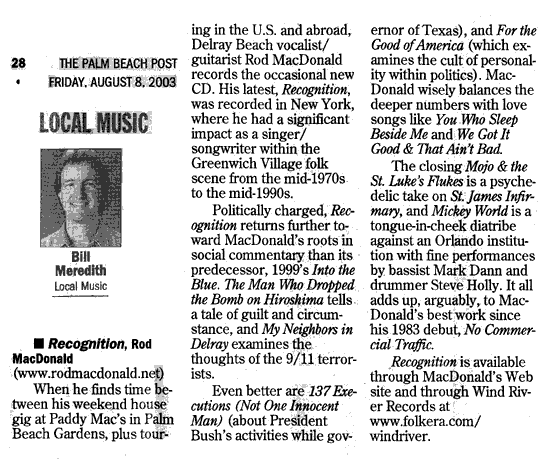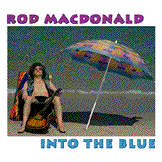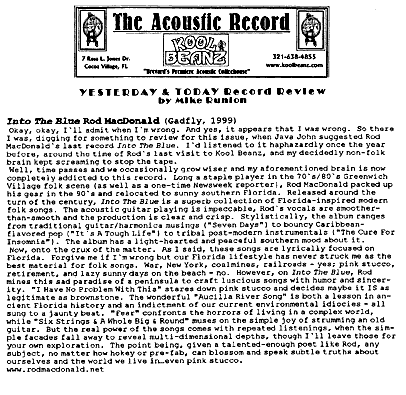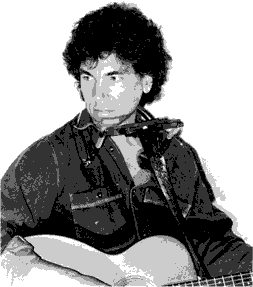Rod MacDonald is setting up shop on what constitutes
a stage at the Coffee Gallery Café in Lake Worth. Dressed
in sandals, black shorts, and a red striped shirt with the
top few buttons open, he tunes his guitar and fiddles with
his beer-stained soundboard. Hair is his most arresting
feature: An unwieldy mass of it shoots from his head like
a graying clown wig. Three doors down, a cover artist is
working his way through a set of classic-rock standards
that includes songs by Jimi Hendrix and Crosby, Stills,
Nash and Young. "At least he's not too loud," MacDonald
tells his audience of about 20 people, a harmonica brace
dangling from his neck. "The guy last week was really
loud." The 51-year-old musician kicks off his set with an
original tune called "It's a Tough Life" from his
forthcoming album, Into the Blue. The song is a facetious
lament on the hardships of life in sunny South Florida.
With his soft tenor voice, MacDonald sings:
It's a tough life
somehow we make it through
making sure that ocean is still blue
and that warm breeze blows at night
and that sun still shines its light
I don't know how we do it, but we do
it's a tough life
somehow we make it through.
Waitresses rush back and forth, carrying pots of
coffee and plates of pesto ravioli. Sitting at a table not
far from MacDonald, college-age hipsters converse loudly
as they smoke cigarettes and drink coffee. Cars noisily
roll past on Lake Avenue. The rain has halted on this
pleasant Sunday evening, but puddles still linger in the
street.
MacDonald continues to sing, unfazed. His eyes are
closed, and his lips barely move. His fingers delicately
pick the guitar, and his legs bounce slightly, in time
with the music. The act seems as much a personal therapy
session as a performance for the ever-shifting sidewalk
audience. Stripped of the full band that once
accompanied MacDonald at gigs in New York City, his
music is sparse, driven by simple guitar melodies and
the occasional harmonica riff. He continues:
Sure the tourists, they do clog up the roads,
and once a year I gotta put on those hurricane boards
but if the wind don't blow us away
and those tourists don't all decide to stay
I think we're gonna make this place our home.
The end of the song is greeted with a smattering of
polite applause.
MacDonald has called South Florida home for four years
now. After crisscrossing the country as a wandering
troubadour in the mid-'70s, then settling down for two
decades as a folksinger in New York City, he arrived in
Delray Beach in 1995 to help take care of his aging
parents.
Since taking up residence here, he's become an
ever-present figure in the South Florida folk scene.
Most Sunday nights from 8 to 11, he can be found at the
Coffee Gallery Café, performing songs from a vast
repertoire of originals as well as a smattering of
covers ranging from Robert Johnson's "When You've Got a
Friend," to James Taylor's "Fire and Rain" (the latter
only under duress, he notes). Friday and Saturday
nights, MacDonald usually performs a Celtic-flavored gig
with Irish-born singer Tracy Sands at either Rooney's
Public House or Paddy Mac's, both in West Palm Beach.
Throw in the occasional house concert or festival, and
he's among the most prolific performers in South
Florida.
An uninitiated audience member watching MacDonald work
his way through "Danny Boy" on a Friday night or "Fire
and Rain" on a Sunday might easily overlook him as just
another cover artist whose renditions are little more
than inoffensive background noise. But lost in the
numbing regularity of MacDonald's performance schedule
is the fact that he's an ingenious songwriter who has
recorded six critically lauded, if commercially
negligible, albums over the past 15 years. During the
'80s he was at the forefront of a Greenwich Village
music scene known as Fast Folk, which, while not nearly
as influential as the '60s era scene that fostered the
likes of Bob Dylan, produced hugely successful artists
such as Shawn Colvin and Suzanne Vega. This fall,
Smithsonian Folkways Recordings will make available the
entire Fast Folk collection -- more than 100 albums --
for the first time on compact disc. MacDonald is one of
the most heavily represented artists on the recordings
with 29 songs, some of which have never appeared on his
albums.
"He's one of the great ones," says Rod Kennedy, founder
of the Kerrville Folk Festival in Texas, one of the most
prestigious folk gatherings in the country. "[He's] a
great American writer who is almost a traditional artist
in the way he writes."
"Rod's one of the best of the singer-songwriters that
ever came out of the New York movement," says Dave Van
Ronk, a redoubtable songwriter himself, who has called
Greenwich Village home since Dylan was tossing back
beers at the Kettle of Fish. On Van Ronk's 1994 album,
To All My Friends in Far-Flung Places, he covers the
MacDonald tune "A Sailor's Prayer." "I don't think it's
generally realized down there just how influential Rod
has been," Van Ronk adds.
Admittedly, South Florida is not Greenwich Village --
nor even Austin, Texas. But MacDonald's presence in the
last few years, coupled with the emergence of the now
nationally renowned South Florida Folk Festival, has
helped spark a growing acoustic-music scene, primarily
in Broward and Palm Beach counties. In South Florida it
is now possible -- if decidedly difficult -- to claim
folksinging as your primary mode of employment.
"When I came down here, it was few and far between to
find a folk musician," says Marie Nofsinger, who has
been performing in the area for two decades.
"Singer-songwriter? Back then, I don't think people even
knew what that meant."
Here in Florida we know what life is worth
we watch the weather channel,
see what's going on up north
then we call up some old friend
say, "Charlie, I see it's snowing again
Me, I'm sitting in my underwear
on the porch"
-- "It's a Tough Life," Into the Blue (1999)
Even before calling Delray Beach home, MacDonald was
a fleeting presence in South Florida. Back in 1985, in an
attempt to resuscitate folk music in the area, Michael
Stock began organizing weekly concerts at a health food
restaurant and then at other venues in South Beach. "The
only folksingers around here back then were '60s
hangers-on," recalls Stock, who has hosted the Folk and
Acoustic Music show on WLRN-FM (91.3) since 1981.
MacDonald became an annual performer on what Stock calls
the "grandmother circuit" -- musicians who squeeze in
South Florida gigs while visiting their elderly relatives.
"He was an angry young man back then," says Stock. "You
never saw him smile. He was always deep in thought."
Since moving to Florida, MacDonald has lightened up
considerably. His favored attire is shorts, sandals, and
a tropical print shirt. He got married three years ago,
drives a Ford Escort, and lives in a comfortable
townhouse not far from the beach. He even owns a mouse
pad imprinted with a picture of him and his Swiss-born
wife, Nicole -- a no-so-subtle symbol of domestic
tranquility.
MacDonald devotes much of his time to caring for his
elderly parents, both of whom are over 80 years of age.
Each afternoon he drives to their Boynton Beach home to
help with mundane chores, such as cooking meals and
cleaning house. He returns at night to help them into
bed. For the first time in 25 years, his musical
passions are taking a back seat to family concerns. "I
think the days of my renting a car and driving around
the country for three months are over for a while," he
says, "if not for good."
Domesticity is reflected in his music as well. Most of
the material on Into the Blue (to be released later this
month on Gadfly Records ) was written after MacDonald
moved to Florida. He sheepishly admits to being
influenced by Jimmy Buffett, and there is more than one
reference on the album to plastic flamingos. The
standard rock 'n' roll percussion setup is often
supplemented with conga drums, and a kalimba contributes
to the melodies on several songs. MacDonald picked up
the xylophone-like African instrument in a Delray Beach
boutique while searching for something that would lend
"It's a Tough Life" a tropical flavor, then ended up
using it on several other songs on Into the Blue.
Sitting at the dining room table in his townhouse on a
recent weekday evening, MacDonald taps away on the
kalimba. The wood-and-metal instrument isn't much bigger
than a mousetrap. He nimbly pecks out the hypnotic
stair-step melody that serves as the foundation for an
instrumental track on the new album. A mandolin, frame
drum, triangle, and gourd weave through the kalimba
melody on Into the Blue, giving the song a feel
reminiscent of Cuban son music.
"I'm a person who suffers from insomnia," MacDonald
says. "I stay up very late at night working, and I have
never been able to figure out if I stay up late because
I can't sleep, or if I can't sleep [at night] because I
sleep so late in the morning. When I started playing
this one night, it was on the same day when I said to my
wife, 'Boy I wish I had a cure for insomnia.' And so
this song became 'The Cure For Insomnia.'"
The effect of MacDonald's newfound serenity is even
more apparent in his most recent lyrics. His
pre-Florida, premarital work reflected an earnest,
politically liberal sensibility more reminiscent of Phil
Ochs than Jimmy Buffett. Humor has always played a part
in MacDonald's songwriting, but in the past it was a
subtle undercurrent, not a prominent feature. (The
beguiling song "Norman," for example, from 1992's
Highway to Nowhere, is a touching tale of mother and son
that just happens to be told from the perspective of
Alfred Hitchcock's protagonist in Psycho.) Although Into
the Blue does include several topical songs ("Deep Down
in the Everglades" is a contemplation of the ValuJet
disaster), the overall tone is actually whimsical. "I
Have No Problem With This" provides a kind of thesis for
the entire album. It is an occasionally goofy meditation
on growing old, mellowing out, and coming to terms with
domesticity. It presents life in Greenwich Village
stripped of all romanticism:
Remember when life meant you were living
in some little apartment on some city street
with the chicken factory across the courtyard
you opened your windows in the summer heat.
South Florida, in contrast, is portrayed as a land
of simple pleasures and few struggles -- not to mention
very little thought. "At this point in my life, I'm not
writing big, anthemic, emotional-agony-type songs,"
MacDonald admits. "What tends to interest me is the
offbeat stuff, the stuff that doesn't sound like it's been
done to death."
More people write songs than listen to them
doesn't mean you can't write a song.
More people sing than get paid for it
doesn't mean you can't sing along.
On every highway, in every town
somebody's wise to the game:
give all the people a song and a dance
and be a keeper of the flame.
-- "Keeper of the Flame,"
And Then He Woke Up (1997)
MacDonald's humility serves him well. The day-to-day
routine of a full-time folksinger in South Florida is
decidedly unglamorous. Marie Nofsinger, a songwriter with
a talent for telling detail and a style that jumps from
country to jazz, has been playing area gigs for almost two
decades. She recalls going to a repair garage to have a
muffler replaced a few years back, only to be recognized
by the guy behind the counter. "You played at my Texaco,"
he said.
In addition to hitting the gas-station circuit,
Nofsinger used to play at a Chuck's Steak House. Earlier
this year she performed at a nudist colony. "I've played
about everything except a bowling alley," says
Nofsinger, whose latest album is called Boots. She now
performs almost every Thursday night at Web Central in
Delray Beach and takes road trips -- to Austin, Texas,
mostly -- for additional gigs. She supplements her
income by working three days a week at the Amp Shop
& Music Parlor in West Palm Beach. "And then when
I'm really broke, I have yard sales," she says only half
jokingly.
Other local folk musicians have had to find creative
ways to make ends meet as well. Magda Hiller, a
Miami-based singer-songwriter, does voice-over work for
radio commercials, and Grant Livingston, whose songs are
steeped in Florida history and geography, works as a
computer consultant. He recently performed an afternoon
show at a nursing home, which, as far as he's concerned,
is nothing to sneer at. "A paid gig in the middle of a
weekday is a really good thing," he says.
Livingston and others note that the fast-paced,
transient lifestyle of South Florida -- particularly
Miami -- does not lend itself to contemplative, quiet
music. "Miami's a tough town," he says. "People don't
like to listen a lot."
Despite the difficulty of competing with the buzz of
electronica and Latin music in South Florida, the
folk-music scene is growing -- particularly in Broward
and Palm Beach counties. A handful of venues, such as
Center Perk Coffeehouse and Chocolate Moose Coffeehouse,
both in Davie, offer acoustic music on a regular basis.
House concerts, for which people transform their humble
abodes into mini concert halls, have also become popular
settings for folk music. There are now three semiregular
house-concert series in South Florida, ensuring at least
one show a month. Headliners at the concerts are usually
out-of-town performers, such as Carla Ulbrich, of South
Carolina, who won the songwriter contest at this year's
South Florida Folk Festival in January, or Jamie
Anderson, of North Carolina, who will perform later this
month at a home in Plantation.
Because house concerts take place in noncommercial
venues, audiences usually aren't too big, but those who
show up pay $8 to $10 for the privilege of seeing a
performer in a very intimate setting. And all of the
money goes straight to the performer -- $400 or more on
some nights, which is a bigger take than he or she gets
at most other venues.
On a recent Saturday evening, a sellout crowd of 40
people paid $10 each to see Amy Carol Webb perform at
Bob and Saralyn Singer's house in Coral Springs. The
concert took place in the Singer's den, a pristine,
white-walled space accented with brightly colored pieces
of modern art and the Singers' collection of almost 1000
hot sauces. (They are recent Dallas transplants.) The
crowd sat on green plastic chairs and sipped sodas.
Alcohol and cigarettes were noticeably absent.
The Singers opened the show by performing a handful of
decidedly amateur but endearing original tunes,
including one about Tennessee roadkill and another about
Bill Clinton's sexual predilections. Webb is a
Miami-based performer who won the songwriter contest at
the South Florida Folk Festival in 1998. She has a
powerful, crystalline voice, and at the Singers' house
she played the guitar stridently. (She broke a string
not five minutes into the show.) Drawing heavily from
her Songweaver CD, Webb played two sets of original
songs, which ranged from the self-deprecatingly funny to
feminist anthems.
In the audience at the Singers' house concert were many
members of the Broward Folk Club, which is largely
responsible for the burgeoning folk-music scene in South
Florida. Founded in 1988 by Robby Greenberg, the club
began with just 20 people at its first meeting. The
group now has about 250 loyal members. "It's amazing how
much it's grown," Greenberg says. Initially, she notes,
"we had a song swap once a month, and we had an open mic
once a month, and that was all that was available in
Broward."
The club's most significant achievement is the annual
South Florida Folk Festival, which began in 1992 and has
morphed into an event that is respected nationwide. In
recent years the festival's songwriting contest has
attracted competitors from across the country, many with
established reputations. Jack Hardy, a veteran of the
New York City folk scene, whose work has been
anthologized in a five-CD boxed set, won the contest in
1997. Sam Pacetti, of St. Augustine, landed a deal with
Waterbug records out of Chicago after the founder of the
label saw him perform at the festival that same year.
"As far as attracting good talent, the last three years
it's been unbelievable," says Michael Stock of WLRN.
MacDonald, who has performed at numerous folk
festivals, says that the songwriter contest ranks in the
upper echelon nationwide. "I think there's probably a
half-dozen that are the top ones, and I would rank it in
that group," he says. He and others note that a large
part of the attraction for out-of-state performers is
the promise of South Florida weather in January. The
festival has also been bolstered by national advertising
in publications such as Performing Songwriter and by
what many people say is the growing popularity of folk
festivals across the country.
MacDonald himself has been instrumental in bolstering
South Florida's reputation in the folk-music world. Last
year he helped put together "Songwriters' Solstice," a
concert featuring 15 South Florida songwriters (folkies
and rock-oriented acts) at the Kravis Center in West
Palm Beach. The sold-out show attracted more than 300
people, and the eponymously titled recording of the
concert was released on CD. For many area musicians used
to playing in coffee shops and bars, the concert was a
rare opportunity to perform for a big audience.
"There are a lot of really good songwriters around
South Florida who, like myself, largely make their
living playing a certain mix of cover tunes and
originals in noisy situations," MacDonald says. "It
seemed to me that if we could bring some of those
talented people together in a situation that was really
aesthetically refined that it would be a very beautiful
thing to do."
But there's no home in this world anymore for a wanderer,
with a waistcoat, a bow and arrow
a pioneer blazing a trail in the hills of Cumberland
riding logs on the river Ohio
but I seek another highway where they
learn to heal the wings of a wounded sparrow
come stand before this fire
glowin' on your skin
come take these searchin' eyes
someplace they've never been.
-- "Song of My Brothers," White Buffalo (1987)
Rod MacDonald's musical sensibility and his interest
in cultivating a folk scene were shaped in his early years
as a performer. Before that, however, he was well on his
way to attaining a middle-class livelihood not so
different from the one he'd experienced growing up in
Connecticut. By 1973 he had earned a bachelor's degree in
history from the University of Virginia, acquired work
experience as a correspondent for Newsweek (covering such
high-profile events as Jimmy Hoffa's parole hearing), and
was enrolled in Columbia University's law school.
He had also joined the U.S. Navy Judge Advocate General
(JAG) Corps as a way to avoid combat in Vietnam and pay
for law school. But as his disgust for the war
intensified, he found himself burdened with guilt for
being part of a military system he abhorred. So he
applied to be classified as a conscientious objector. In
the summer of 1973, while his request was being
considered, he was assigned to Newport, Rhode Island,
for military training school. While there he secured a
gig at a local club. "I spent the summer going to
classes during the day and singing, 'One, two, three,
what are we fightin' for?' at night," he recalls. At the
end of the summer, the military agreed to grant him
status as a conscientious objector.
After finishing his final year of law school (on his
own dime), MacDonald didn't bother with the bar exam.
Instead he became an itinerant musician. "I wanted to
put myself in a position where I had to play music to
survive," he says. "I felt that was the only way that
I'd ever get good enough to be able to do this. And also
I wanted to find out who was out there in the world,
what kind of people were really out there. I wanted to
get away from the cozy protected people and out into the
people that were what I considered more real in a
certain way. I was young and arrogant, and that's how I
felt. I wanted to test myself against the real world."
Based in Chicago, MacDonald traveled the country mainly
by thumb, picking up gigs wherever he could. In 1974,
while in New York City, he encountered one of his
musical idols. Phil Ochs, the '60s folksinger and
protest maven best remembered for his songs assailing
the Vietnam War, such as "I Ain't Marching Anymore," was
then in the midst of organizing a benefit concert in
honor of the recently slain Chilean leader Salvador
Allende. The concert was to be a massive event, held at
Madison Square Garden and featuring, most notably, Bob
Dylan. Hoping to join the roster of performers,
MacDonald auditioned for Ochs.
As MacDonald remembers the encounter, Ochs was running
the Allende benefit operation out of a cramped office
buzzing with people and telephones. Amid the chaos the
26-year-old folksinger played Ochs a song he'd written
about the Chilean coup. "Phil squatted down on his
haunches, and he listened to me play him my entire
song," MacDonald recalls. "People were trying to
interrupt him the whole time. They were going, 'Hey
Phil, I need you over here.' 'Hey Phil, Baez is on the
phone, she needs a hotel room.' 'Hey Phil, McGuinn's in
town, he wants to know what to do.' He kept pushing them
all away, and he listened to me play my entire song.
Then he said to me, 'I'm sorry I can't have you in the
show, but I want to thank you for coming by.'"
MacDonald says he wasn't put off by the rebuff. "I was
pretty green," he says. "I don't hold it against him
that he didn't put me in the show. But I do value the
moment that he gave me to play for him very highly." In
fact, on the 1998 tribute album What's That I Hear? The
Songs of Phil Ochs, MacDonald covers the Ochs song
"Pleasures of the Harbor."
Despite his failure to make the cut for the Allende
benefit, MacDonald would soon be poised to move beyond
the hitchhiker circuit. After spending a few more years
on the road, he returned to New York City in 1977, this
time for an audience with renowned talent scout John
Hammond, Jr. The musicians Hammond had recruited and
produced for Columbia records in the past were
legendary: Bessie Smith, Billie Holiday, and George
Benson, among them. Well before he became famous, Bob
Dylan was known as "Hammond's folly" because of his
rough-hewn voice and often-cryptic lyrics. More recently
Hammond had discovered a young man from New Jersey named
Bruce Springsteen.
MacDonald was hoping to be the next unearthed gem. He
found an apartment in New York and auditioned for
Hammond with positive results. He was set to record some
tracks with the producer in hopes of securing a record
deal. Before the sessions could take place, however, the
almost-70-year-old Hammond suffered a heart attack,
which forced him into retirement. "Without his guidance
I really was kind of at sea for what to do in terms of
walking into a bigtime recording studio and playing my
songs," MacDonald recalls. "I really didn't know how to
do that."
Even without a record deal, he would make New York City
his home for the next two decades. The heyday of the
'60s folk scene in Greenwich Village was long gone, so
MacDonald and other struggling artists set about
creating their own. Every Monday night a group of
songwriters that included Tom Intondi, Lucy Kaplansky,
and David Massengill met at the Cornelia Street Café to
swap new songs. Out of these weekly hootenannies came an
album, Cornelia Street: The Songwriter's Exchange,
released in 1980 on Stash Records. It included two songs
written and performed by MacDonald. Shortly after the
album's release, Stereo Review ran a glowing review, and
MacDonald was among those singled out for praise: "Songs
not only perceptive and linguistically rich, but touched
with grace," the reviewer wrote of his work.
Despite this early success, many of the folkies were
finding it difficult to land record deals. In 1982 Jack
Hardy suggested they start up a musician-run label. Ten
times each year, the label recorded new songs from a
dozen different artists. Within two weeks each recording
was on the streets for a price of just $2. The idea was
to get the music into consumers' hands as quickly as
possible, so the label was called Fast Folk.
Just as Fast Folk was getting started, the Speakeasy
opened on MacDougal Street. Like the record label, the
folk club was run by musicians for musicians. Many of
the songwriters who laid down tracks for Fast Folk
performed at the Speakeasy. MacDonald lived across the
street from the club, and for much of the early and
mid-'80s he was in charge of booking the venue. Mark
Dann, who's worked with MacDonald as a musician and a
producer for the last two decades, recalls that
MacDonald was the first person to offer a little-known
folksinger named Suzanne Vega a booking. "Before that,"
Dann says, "no one would give her a gig."
Artists who honed their chops in this thriving scene
are legion. Shawn Colvin, Tracy Chapman, John Gorka,
Lyle Lovett, and Vega all worked with Fast Folk prior to
becoming household names. Countless lesser-known
musicians made their first (and often last) recordings
on Fast Folk. The venture eventually became known as
Fast Folk Musical Magazine, which published interviews
and articles and released albums.
The movement reached an initial peak of respectability
in 1984, when the first Fast Folk Revue took place at
the Bottom Line. The then-decade-old Greenwich Village
club had several times the capacity of the Speakeasy and
was known for hosting notable artists like Bruce
Springsteen. Among the relative unknowns performing that
night were Vega, Kaplansky, and Christine Lavin. Near
the end of the first set, MacDonald delivered a gripping
rendition of his song "American Jerusalem," a stark
meditation on urban life:
Oh, I been around
you could spend forever looking for a friend in this town
and all you get to do is lay your dollar down
'til you're stumbling drunk up the stairs again
and the sign says,
"Welcome to American Jerusalem."
MacDonald was backed by a stellar band consisting of
guitarist, bass player, and drummer. "I don't even think
we rehearsed," he notes, "which makes it all that much
more startling that it was as good as it was."
Richard Meyer, former editor of Fast Folk Musical
Magazine, says the performance of "American Jerusalem"
became a defining moment for the Fast Folk scene. "There
was just a feeling in the room that something serious
was happening," he says. "People realized that they had
made a step up from being around the corner, at the
Speakeasy."
Dann, who played bass on "American Jerusalem" that
evening, recalls MacDonald saying afterward that it was
"the greatest moment of his life."
"I remember it being a very magic moment," MacDonald
notes. "I got that feeling as much from the performers
backstage after it was over as from the audience. People
were hugging me and saying, 'You really did it, Rod, you
showed 'em we can do this.'"
Fast Folk stopped producing albums last year, after
more than 15 years, but the Bottom Line shows continue
to take place annually. The entire catalog of Fast Folk
recordings was recently donated to Smithsonian Folkways
Recordings to be remastered on compact disc. By the end
of this year, more than 100 Fast Folk compilations will
be available for purchase.
"I'm not a '60s folkie," says MacDonald. "I'm a person
who came of age in the music world in the '70s, '80s,
and '90s. The Fast Folk thing presented the first work
of a lot of very important people. I think it's worth
keeping as a historical document."
I know a guy in software design
he's online all the time
just trying to duplicate this sound
But it will never sound as clean
as my old wood machine
six strings and a hole big and round.
-- "Six Strings & a Hole Big & Round,"
Into the Blue (1999)
MacDonald's musical career has taken him many places
since 1984. He's recorded six albums for three labels and
performed in hundreds of venues. In the late '80s and
early '90s, he opened a slew of New York-area shows for
folkie and Woodstock performer Richie Havens. Each year
MacDonald tours Europe, particularly Switzerland and
Germany, where he has built up a following. He lived in
northeast Italy for a time and made two trips to
Czechoslovakia in the wake of the fall of the communist
regime there to perform at concerts and festivals,
sometimes for thousands of people.
If the folk scene in South Florida is going to continue
to grow, MacDonald says, it'll need a respectable venue
that showcases performers on a regular basis. He notes
that there are attractive performance spaces in the
area, but most showcase folk music maybe ten times a
year rather than every night. "There's nothing like the
clubs in Greenwich Village, where six, seven nights a
week there are really good songwriters playing original
music," he says. "But there is work for people that play
and sing well."
Tonight MacDonald finds himself in the humble
surroundings of the Coffee Gallery Café in Lake Worth.
With 11 p.m. approaching, the crowd has thinned to about
a dozen people -- if you count the owner of the café and
two waitresses, who have repaired to tables. Someone
sitting at a sidewalk table has called out a request for
the John Denver song "Take Me Home, Country Roads."
Looking momentarily nonplussed by the request, MacDonald
tells the audience that, before Denver died in a plane
crash two years ago, it wasn't fashionable to play his
songs. He then gamely recounts a story of how, back in
the '70s, his ability to knock off a few Denver tunes
helped him find a ride into Pittsburgh in the middle of
the night.
"Take Me Home, Country Roads" is followed by a Donovan
song and then a Leonard Cohen tune. For his final
number, MacDonald performs an earnest political anthem
called "Who Built the Bomb? (That Blew Oklahoma City
Down)." "So who lit the bomb that blew Oklahoma City
down?" he sings. "'Not I,' said the preacher, book in
hand, with his personal knowledge of God's great plan/
'God will punish those who do wrong and sometimes we
need to help Him along.'"
The song is greeted with hearty claps from those
remaining.
"Hey Rod, who wrote that one?" asks a man who says he
used to see MacDonald play all the time in New York
City.
"Me," MacDonald smiles. "I'm the guilty man."
|
